Conservative treatments for Tennis Elbow are typically very successful. Only 10% of people suffering from Tennis Elbow will ever need surgery. In fact, most doctors and surgeons will recommend 6 to 12 months of conservative treatment before surgery will even be considered. If constant pain, immobility, and inflammation from your Tennis Elbow is greatly interfering with your quality of life, and you've tried every conservative option available to you - your doctor may present surgery as an option to relieve your pain.
If you are not yet sure if you require surgery, go to our Do I Need Surgery page. This page will be helpful for you in ensuring that you are doing all you can to minimize your chance of requiring surgery.
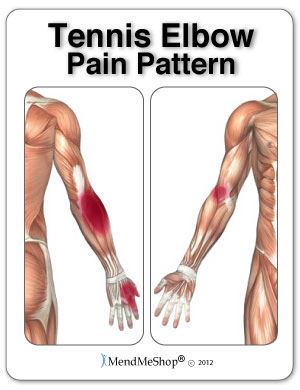
Lucky for you, approximately 80 - 90% of Tennis Elbow procedures are successful. Tennis Elbow surgery will focus on 2 main things...
By getting rid of weak and damaged tissue built up in your tendon from repeated injury and overuse, you can begin to re-strengthen your elbow to avoid further injury. When conservative treatments fail, surgery may provide pain relief and return elbow function to what you need to get back to your job, your recreational activities, and your life.
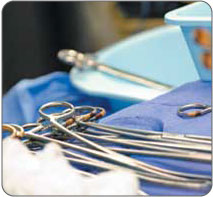
While most studies show that complications arising from Tennis Elbow surgery are rare, there are always risks associated with any surgical procedure. The most common risk factors associated specifically with Tennis Elbow surgery include permanent loss of some elbow strength, range, or mobility. During the operation, surrounding blood vessel and nerve damage can occur. However, modern surgical techniques and guidance imaging devices have greatly improved recovery times and successful outcomes for Elbow surgery; a couple decades ago, positive outcomes were much less common.
As with any surgical procedure, there are risks. It is best to talk to your orthopaedic surgeon before and after surgery to discuss all possible risks and complications.
You should expect some tenderness, pain, and stiffness after the surgery. It's important to remember that during your surgical procedure, your elbow will become re-injured in order to encourage proper healing. These symptoms are common after surgery and will be reduced if you commit to conservative treatments and PT during your rehabilitation.
If you have already undergone elbow surgery, we recommend you visit our Post-Surgery Rehabilition and Recovery for Elbow Surgery page.

"Traditionally, the standard procedure for lateral epicondylitis has been an open release"
Reference: Nirschl RP, Pettrone FA, 1979. "Tennis elbow. The surgical treatment of lateral epicondylitis." J Bone Joint Surg Am 61 (6A): 832-9
"Open release is simple and reproducible with excellent results and still considered the 'gold standard'. Open release has good long-term results. A study by Dunn showed that 84% of patients had good to excellent results and 93% returned to sports at minimum 10-year follow-up. Nirschl and Petrone also reported excellent results in 75% of patients with open release."
Open vs. Arthroscopic Treatment of Lateral Epicondylitis - OrthopaedicsOne Viewpoints - OrthopaedicsOne
"Open Vs. Arthroscopic Treatment Of Lateral Epicondylitis - Orthopaedicsone Viewpoints - Orthopaedicsone." Orthopaedicsone.com. N. p., 2018. Web. 8 May 2018.
The most common surgery used to treat Tennis Elbow is Open Release Surgery. There are two different techniques that can be used: (1)Traditional Open Release and, (2)Open Release with Drilling; both been successful in treating Tennis Elbow.
Open Release is performed through a 2.5 - 7 cm incision created in the skin on the outside of the elbow above your epicondyle. This incision exposes the ECRB (exstensor capis radialis brevis ) forearm muscle beneath the skin. Another incision in the muscle gives the surgeon access to the tendon and its attachment to the lateral epicondyle bone. The surgeon will either remove any damaged weakened tissue, or repair tears to the tendon tissue. Your surgeon may be partially or even completely cut your tendon away from the lateral epicondyle. This allows the forearm muscle to relax.
Scar tissue that has built up through repeated injury and overuse is removed through a process called Debridement. During the removal of scar tissue and normal wear and tear, the elbow can become rough. The surgeon will abrade the bone of your elbow. This smoothes out the roughness of your elbow and removes any hardened tissues.
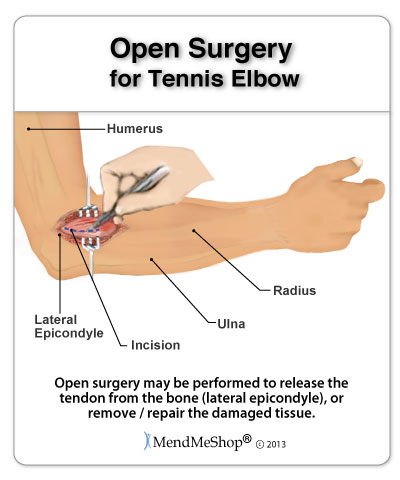
A technique called decortication can be used at this point. With this procedure, several 2 mm holes are drilled into the bone to stimulate blood flow to the area.
Bone and cartilage debris is taken away and sutures are installed using anchors to reattach your tendon to your bone. The surgeon will use dissolving stitches to seal the first cut made in your skin. Your arm will be placed in a splint or cast to keep from moving your elbow until your doctor says you are ready to begin light movements.
A 2001 study published in the British Medical Journal evaluated open and arthroscopic release surgeries. While both were found to be successful in the long term, drilling was no more effective in treating Tennis Elbow than traditional open release surgery. In fact, patients who underwent the drilling procedure were found to have more pain, stiffness, and bleeding of the wound than non-drilling patients during recovery.
Arthroscopy for Tennis Elbow involves creating very small incisions in your skin at and around the epicondyle. These incisions act as entry points for thin tubular instruments to be inserted into your elbow. One of these tools is a small, high powered camera that uses a fiber optic lense to record the inside of your elbow. Fluid is injected into your joint so the camera can give a clearer image and the surgeon has a better view of your elbow during the procedure. The images captured by the lense are sent to a television screen so that the surgeon has a magnified view of the inside of your elbow.
The surgeon will inspect your elbow joint and see if there are any other issues, such as arthritis. Once your elbow has been fully checked out, another incision is made, so that tools for removing tissue and tendon repair can access your elbow. Using the guidance of the imaging on the television screen, the surgeon uses a sharp tool to remove inflamed and damaged tissue.
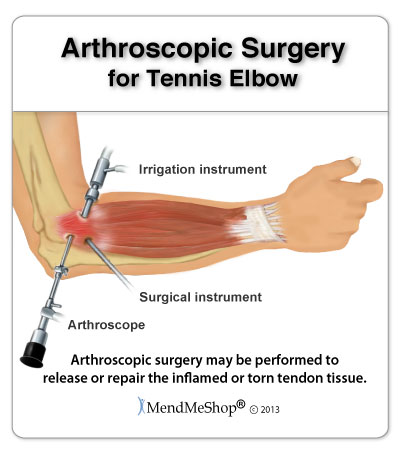
Another tool is used to cut away part, or all of, the tendon depending on the amount of damage. Once the scar tissue and hardened joint tissues are removed, the epicondyle is smoothed. Anchors are drilled into the bone to help sutures reattach the tendon to the bone. Once this is done, the tools are removed and the incision points are stitched shut. Your arm is splinted to prevent movement.
While both Open Release and Arthroscopic surgeries are 80 - 90% effective, arthroscopic surgeries have the added benefit of:
The Journal of Shoulder and Elbow Surgery, showed 91 - 98% success rate for full symptom relief of Tennis Elbow after arthroscopic surgery. Since arthroscopy can not only repair known injuries but also identify other conditions, this study concludes that arthroscopic surgery could be more beneficial than other surgical options available for Tennis Elbow.
Percutaneous Tenotomy is a new, alternative form of surgery for Tennis Elbow. This procedure was recently introduced in the early 2000's. Studies are still being conducted to verify the effectiveness of percutaneous tenotomy, and all have shown positive results. This procedure does not require an anaesthetic, like in Open and Arthroscopic procedures. The only entry points into your elbow are made via a hypodermic needle.

This procedure uses sonographic images, similar to those used in prenatal care, to view the unborn child of a pregnant mother. These images, created using imaging ultrasound waves, help guide the surgeon, while repeatedly penetrating the joint tissues of the elbow with the tip of the needle. The surgeon can feel when the tissues have become softer. Once hardened tissue has been broken up to allow access to the bone, the surgeon uses the head of the needle to smooth out the epicondyle. Removing damaged tissue without having to cut the tendon is one of the major benefits of percutaneous tenotomy.
The hypodermic needle is removed when the sonogrpahic images show that all of the hardened tissue has been broken up and the epicondyle is smooth. At this point your elbow will be injected with a shot of corticosteroid. This step is under review and future percutaneous surgeries may not require the coticosteoid injection at all. Medical tape is placed over the incisions and there is no need for stitches

Because this procedure does not require an anaesthetic, it can be performed in a clinic or at a doctors office. Directly after the 20 minute surgery is completed, the physician will help you to gently move your arm. Unlike open and arthroscopic surgeries, percutaneous surgery does not require you to wear a splint to keep your arm from moving. In fact without large incisions or sutures, the risk for infection is greatly reduced.
According to an article published on December 2nd, 2012 in the online US National Library of Medicine, many individuals found immediate pain relief after the soft tissues were broken up. This is however, still a newer method of surgery, therefore we anticipate many more studies to follow, concerning the overall effectiveness of this procedure.
Having surgery will require you to spend time rehabilitating your elbow. Depending on the amount of damage to your elbow before surgery, it could take anywhere from one week to the larger part of a year before there is a noticeable reduction in your Tennis Elbow symptoms.
Each surgical procedure takes between 15-20 minutes to complete. In Open Release and Arthroscopic surgeries you will be put under using general anaesthesia. For all three of the above procedures, numbing medication will be injected into your elbow to temporarily block pain signals. A compression tourniquet or adrenaline injection is used to reduce swelling of the elbow during surgery. After the surgery you will be monitored and most likely released the same day. Out-patient (same day) surgery is common for all Tennis elbow procedures.
Your doctor will recommend the surgical procedure that best fits your situation based on the severity of your Tennis Elbow and their experience with successful techniques. Whichever surgery is used, you will have to undergo PT and conservative elbow treatments after the operation. Your physician should provide you with a rehabilitation program that will begin a few days or weeks after your surgery. Healing time and recovery will depend on the severity of your injury before surgery, the type of surgery performed, your age, and your overall health.
Being proactive is the best way to increase your chances of recovery and minimize the time spent treating your Tennis Elbow. If you keep your elbow immobile for too long or you do not commit to conservative treatments after surgery, your chances of getting back your full range of motion, grip strength, and fast relief from pain, are greatly reduced. Cooling and warming treatments are essential in reducing swelling and stimulating blood flow to your elbow during healing. Speak to your physician about incorporating the Elbow TShellz Wrap® into your post-operative program to optimize rehabilitation and decrease recovery time.
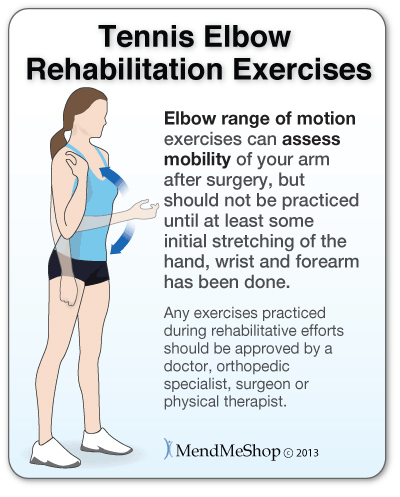
If you require surgery, then you've already spent too much of your life in pain. Maybe you've missed months of work or an entire season playing your favorite sport. You deserve to return to a great quality of life and begin to enjoy an active lifestyle once again. Why spend more time in recovery than you need to? Using a Cold Compress or Ice Pack and Circulation Boost (via the Elbow TShellz Wrap®) alongside the physical treatments recommended by your physician will help shorten your recovery time, reduce re-injury risk and increase your chance of greater rehabilitative success.
It is important that you consider most physicians will have already encouraged you to commit to trying conservative treatments before even turning to surgery. Surgery is not a quick fix option. Unless your physician determines you require surgery, conservative treatments using a combination of cold treatments and localized blood circulation boost treatments (such as the Elbow TShellz Wrap®) will help you to achieve positive results faster. If you have found the TShellz Wrap® does not aid in your elbow recovery, know that we offer a 60 day full money back return option. This means that we guarantee the Elbow TShellz Wrap® will help you!
Why let pain and decreased mobility stop you from living the quality of life you deserve? Incorporate conservative treatments into your post-surgery rehabilitation plan today to get back to your work, your activities, and your life!
Most cases of tennis elbow respond well to conservative treatments, however, surgery will be needed in some cases. Being presented with a recommendation for surgery is certainly a scary thought for most. The Internet provides a wealth of information and details on the surgery itself, but it can be a challenge to find quality information on if you need surgery and what to do to speed recovery after the surgery. This is why we are here!
Using the TShellz Wrap® is truly a unique experience. Within moments of applying a treatment to your injured elbow, you can feel the healing sensation due to the increase in blood flow deep within the area. During a treatment, and for quite some time after you finish, the treated area will feel relaxed and less painful. It's a very soothing sensation and extremely effective.
TShellz Wraps® contain a unique Carbon Fiber Energy Pad which is flexible and will shape to conform to your body. This Energy Pad emits a uniform wave of perfectly safe energy over its entire surface. This energy is absorbed by soft tissue in the treatment area, opening blood vessels, resulting in an increase in blood flow. Increased blood circulation is what your body needs to maximize its cabability of healing soft tissue and this is why we recommend the TShellz Wrap®.
The Elbow TShellz Wrap® is an FDA Registered Medical Device and is suitable for use in therapeutic clinics and FROM HOME. It is completely safe for people and patients to use for themselves.
The technology found in a TShellz Wrap® has been used for decades in the worlds of professional and amateur sports - a contributing factor as to why athletes seem to recover from injuries so quickly.
Have you ever wondered by an athlete can return to activity after 4 or 5 weeks following an elbow or forearm injury - while your average person takes much longer to return back to normal? The secret isn't really that much of a secret - it involves consistent treatments (meaning multiple times a day) using a treatment like the TShellz Wrap® to stimulate blood flow to the injured tissues. Most athletes have the luxury of using in-house facilities many times per day.
How many us can afford the time and money to visit a clinic multiple times a day? Very few indeed. This is how you can gain some of the advantages that athletes enjoy in their injury recovery - by using a device like the Elbow TShellz Wrap® two or three times a day on a consistent basis.
We believe the TShellz Wrap® to be one of the most effective home treatments to increase localized blood flow to soft tissue in and around the treatment area.
We can promise that you will receive a product that is designed to be safe and does what it is supposed to do... reduce pain (as stated in "Therapeutic Heat and Cold", 4th edition. - Ed. Justus F. Lehmann, M.D., Williams, and Wilkin) temporarily increase length & flexibility of soft tissue (as stated in "Therapeutic Heat and Cold", 4th edition. - Ed. Justus F. Lehmann, M.D., Williams, and Wilkin) and aid your body in recovering from tendon, muscle and other soft tissue injuries via enhanced blood flow.
The unit plugs into a standard wall outlet to get its power. The nice thing about the power supply is that the same unit can be used in North America and overseas as well. It has the capability to operate between 110v and 230v.
The TShellz Wrap® has a special signal controller that can be set for 3 different power levels of application (3=High, 2=Medium, 1=Low). The cord is long enough that you can sit or lie comfortably and watch TV, read or surf the net while you're using it.
Treatments are max 30 minutes in duration and the device can be worn over clothing. This allows you to use the device at work, at home, or really anywhere you have access to an electrical outlet.
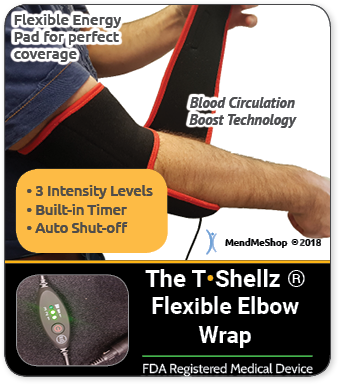
We recommend the use of an Elbow TShellz Wrap®:
Product Advisors are available 9:00 am to 5:00 pm Eastern Standard Time Monday to Friday.
I want to learn more about TShellz Wrap® Circulatory Boost
I want to learn more about Ice & Heat: Which Is Better For Treatment?
I want to learn How To Get Rid of Tennis Elbow
I want to learn How To Get Rid of Golfers Elbow
I want to learn more about Elbow Anatomy
I want to learn more about Elbow Surgery
I want to learn more about Elbow Post-Surgery Recovery
During your recovery, you will probably have to modify and/or eliminate any activities that cause pain or discomfort at the location of your soft tissue injury until the pain and inflammation settle. The more diligent you are with your treatment and rehabilitation, the faster you will see successful results!
Please be aware that this information is neither intended nor implied to be a substitute for professional medical advice. CALL YOUR HEALTHCARE PROVIDER IMMEDIATELY IF YOU THINK YOU MAY HAVE A MEDICAL EMERGENCY. Always seek the advice of your physician or other qualified health provider before using any of our outstanding products to make sure they are right for you and your condition or if you have any questions regarding a medical condition. Always see your doctor for a proper diagnosis as there are often many injuries and conditions (some very serious) that could be the cause of your pain.
© 2025 In.Genu Design Group, Inc. Contact Us